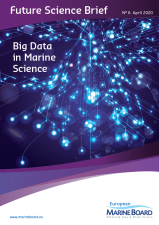
Marine science is rapidly entering the digital age. Expansions in the scope and scale of ocean observations, as well as automated sampling and ‘smart sensors’, are leading to a continuous flood of data. This provides opportunities to transform the way we study and understand the ocean through more complex and interdisciplinary analyses, and offers novel approaches for the management of marine resources. However, more data do not necessarily mean that we have the right data to answer the critical scientific questions and to make well-informed, data-driven management decisions on the sustainable use of ocean resources. To increase the value of the wealth of marine big data, it must be openly shared, interoperable and integrated into complex transdisciplinary analyses using artificial intelligence.
The marine science community has not yet reached the big data revolution. The ‘data deluge’ introduces a unique set of challenges that are new to many marine scientists, which should be overcome to ensure the maximum value of marine big data can be reaped. EMB’s Future Science Brief No 6 on ‘Big Data in Marine Science’ identifies bottlenecks and opportunities related to data acquisition, data handling and management, computing infrastructures and interoperability, data sharing, big data analytics, data validation, and training and collaboration. Topics and case studies on climate science and marine biogeochemistry, habitat mapping and planning new marine protected areas, networks of biological observations, and pest control in the aquaculture sector are used to highlight the challenges and recommendations for Big Data in Marine Science.
This publication was authored by the EMB Working Group on Big Data in Marine Science, led by Lionel Guidi (Laboratoire d'Océanographie de Villefranche-sur-Mer (LOV), CNRS, France) and Antonio Fernàndez Guerra (Lundbeck Foundation GeoGenetics Centre, University of Copenhagen, Denmark).
Infographic summaries of the document are available here.
This document was launched on 29 April 2020 during a dedicated webinar. You can find details here.